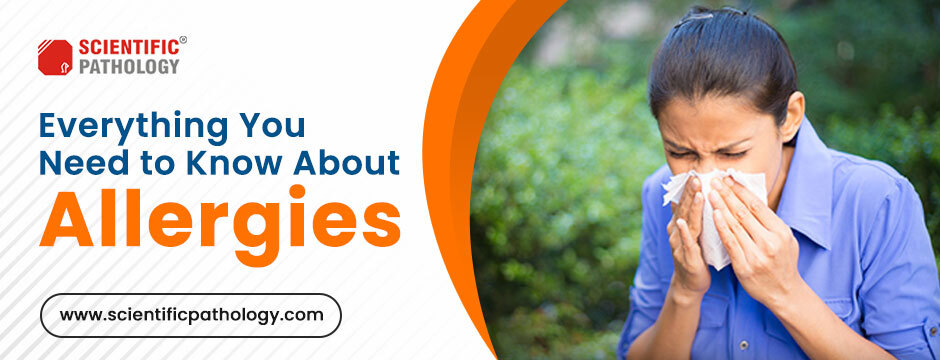Everything You Need to Know about Allergies – Visit A Pathology Collection Centre in Aligarh
Do you often find yourself sneezing uncontrollably, with itchy eyes and a runny nose? Or perhaps you've experienced unexplained rashes or digestive issues after eating certain foods? These could be signs of allergies! So, understanding the root cause of your symptoms is essential for effective management and relief. Therefore, you need to visit the best pathology collection centre in Aligarh.
Allergies are a widespread health condition that affects millions of individuals throughout the world. While some individuals suffer from mild symptoms, others experience severe reactions that can be life-threatening. Understanding allergies is crucial for proper management and prevention.
Let’s cover everything you need to know about their causes, symptoms, diagnosis, treatment options, and prevention strategies.
What are ‘Allergies’?
Allergies are an excess response of the body's immune system to otherwise innocuous chemicals. Allergens are chemicals that cause an immunological reaction. Thus, these phenomena lead to the release of histamines and other chemicals in the body.
Common allergens include pollen, pet dander, dust mites, certain foods (e.g., nuts, shellfish), insect stings, and medications.
The types of allergies:
There are several types of allergies that individuals may experience.
Respiratory allergies:
These allergies affect the respiratory system and include hay fever (allergic rhinitis), triggered by pollen, mould spores, or pet dander.
Food allergies:
Certain foods can cause allergic reactions, ranging from mild itching to severe anaphylaxis. Peanuts, soy, fish, tree nuts, eggs, milk, wheat, and shellfish are all typical dietary allergies.
Skin allergies:
Contact dermatitis is a prevalent form of skin allergy, caused by direct contact with allergens like latex, poison ivy, or certain metals.
Insect sting allergies:
Some people develop allergic reactions to insect stings from bees, wasps, hornets, or fire ants.
Drug allergies:
Certain medications can trigger allergic reactions in susceptible individuals, leading to skin rashes, hives, or more severe symptoms.
Hence, search for the best scientific pathology lab for your allergy tests.
What are the symptoms of allergies?
Allergy symptoms can vary depending on the type and severity of the reaction. Common symptoms include below.
- Sneezing, runny or stuffy nose
- Itchy and watery eyes
- Skin rashes, hives, or eczema
- Swelling of the lips, tongue, throat, or face
- Shortness of breath, wheezing, or coughing
- Nausea, vomiting, abdominal pain, or diarrhea (food allergies)
- Anaphylaxis (It’s a severe, life-threatening reaction characterized by difficulty breathing, drop in blood pressure, and loss of consciousness)
The allergist:
When it comes to allergies, seeking the expertise of an allergist is like having a detective on your case. These medical specialists are highly trained to unravel the mystery behind your allergic reactions and provide targeted solutions. They utilize a combination of thorough medical history, advanced testing techniques, and a keen eye for details. Thus, allergists can pinpoint the specific allergens wreaking havoc on your immune system.
Hence, it’s evident that, advanced diagnosis through a pathology collection centre in Aligarh plays a critical role in allergy treatment.
Diagnosis of allergies through a pathology collection centre in Aligarh:
Medical history:
The journey towards an accurate allergy diagnosis begins with a detailed medical history assessment. Your allergist will sit down with you and ask a series of questions to gather crucial information.
They'll inquire about your symptoms, their duration and frequency, and any potential triggers you may have noticed. Family history will also come into play, as allergies often have a genetic component.
By carefully listening to your experiences and examining patterns, the allergist can already start forming hypotheses about the potential allergens responsible for your symptoms. This initial step sets the stage for further investigations.
You can also use our convenient online lab reporting lab in UP for getting your reports fast.
Skin tests:
Imagine playing a game of “allergy clue” with your skin as the game board. Skin tests are one of the most common and effective diagnostic tools employed by allergists. During this painless procedure, small amounts of suspected allergens are gently pricked or scratched onto your skin's surface.
If you are allergic to any of these substances, your immune system will react. Therefore, this will cause a localized in skin reaction, such as redness, swelling, or a small hive.
The allergist will carefully observe the reactions and note the intensity of each response. By comparing the results to a control sample, they can determine which allergens trigger your immune system. Skin tests are especially useful for identifying respiratory and environmental allergens. It could be like pollen, pet dander, dust mites, mould spores, and certain foods.
Blood tests:
In some cases, skin tests may not be feasible or appropriate. Allergists can then turn to blood tests, an equally valuable diagnostic tool. A small blood sample is drawn and sent to the lab for analysis.
The lab technicians will measure the levels of specific antibodies, known as immunoglobulin E (IgE), in your bloodstream. Elevated IgE levels to certain allergens can indicate sensitization to those substances.
Blood tests are less immediate than skin tests. Though, they are particularly useful when skin conditions, medications, or medical conditions may interfere with skin test accuracy. In addition to that, for patients with severe skin conditions like eczema, blood tests can be a safer alternative.
So, if you have to do blood tests and other related tests for allergy treatment, consider visiting Scientific Pathology. It is an affordable and reliable pathology collection centre in Aligarh.
Elimination diet:
For individuals suspecting food allergies, the allergist may suggest an elimination diet. This process involves removing specific foods from your diet that are suspected of causing allergic reactions. After a period of complete avoidance, potential trigger foods are gradually reintroduced one at a time while closely monitoring any adverse reactions.
The elimination diet helps to identify problematic foods and is especially helpful for isolating triggers when multiple allergens are suspected. It is important, however, to undertake this process under the guidance of a healthcare professional. It ensures proper nutrition and safety throughout the evaluation.
With the help of the above-mentioned tests, allergists can confidently confirm the presence of specific allergies. This comprehensive approach allows for precise identification of the culprits responsible for your symptoms.
Treatment options:
The most effective way to manage allergies is to avoid known allergens. Additionally, several treatment options can alleviate symptoms and improve the quality of life. It could be possible with the help of proper test results from a scientific pathology lab.
Antihistamines:
These over-the-counter or prescription medications block the effects of histamines, reducing symptoms like sneezing and itching.
Nasal Corticosteroids:
These nasal sprays help relieve inflammation and congestion in the nasal passages.
Immunotherapy (Allergy Shots): Allergy shots can desensitize the immune system over time, reducing the severity of allergic reactions.
Epinephrine Auto-injectors: Individuals with severe allergies, particularly to insect stings or certain foods, should carry an epinephrine auto-injector in case of anaphylaxis.
How to prevent allergies?
Preventing exposure to allergens is the key to managing allergies. Consider the following prevention strategies.
- Allergen avoidance: Identify and minimize exposure to known allergens, such as pollen, pet dander, and mould.
- Keep indoor air clean: Use air purifiers and keep windows closed during high pollen seasons.
- Dust mite protection: Encase mattresses and pillows in allergen-proof covers, wash bedding regularly, and keep humidity levels low.
- Food allergy awareness: Read food labels carefully, inform restaurants about your allergies, and carry necessary medications.
End note:
Understanding allergies empowers individuals to take control of their health and well-being. By recognizing the symptoms, seeking a proper pathology collection centre in Aligarh, etc., individuals can manage allergies successfully. Therefore, they would easily lead a fulfilling life.
Remember, if you suspect allergies or experience severe reactions, consult an allergist for personalized guidance and care.




